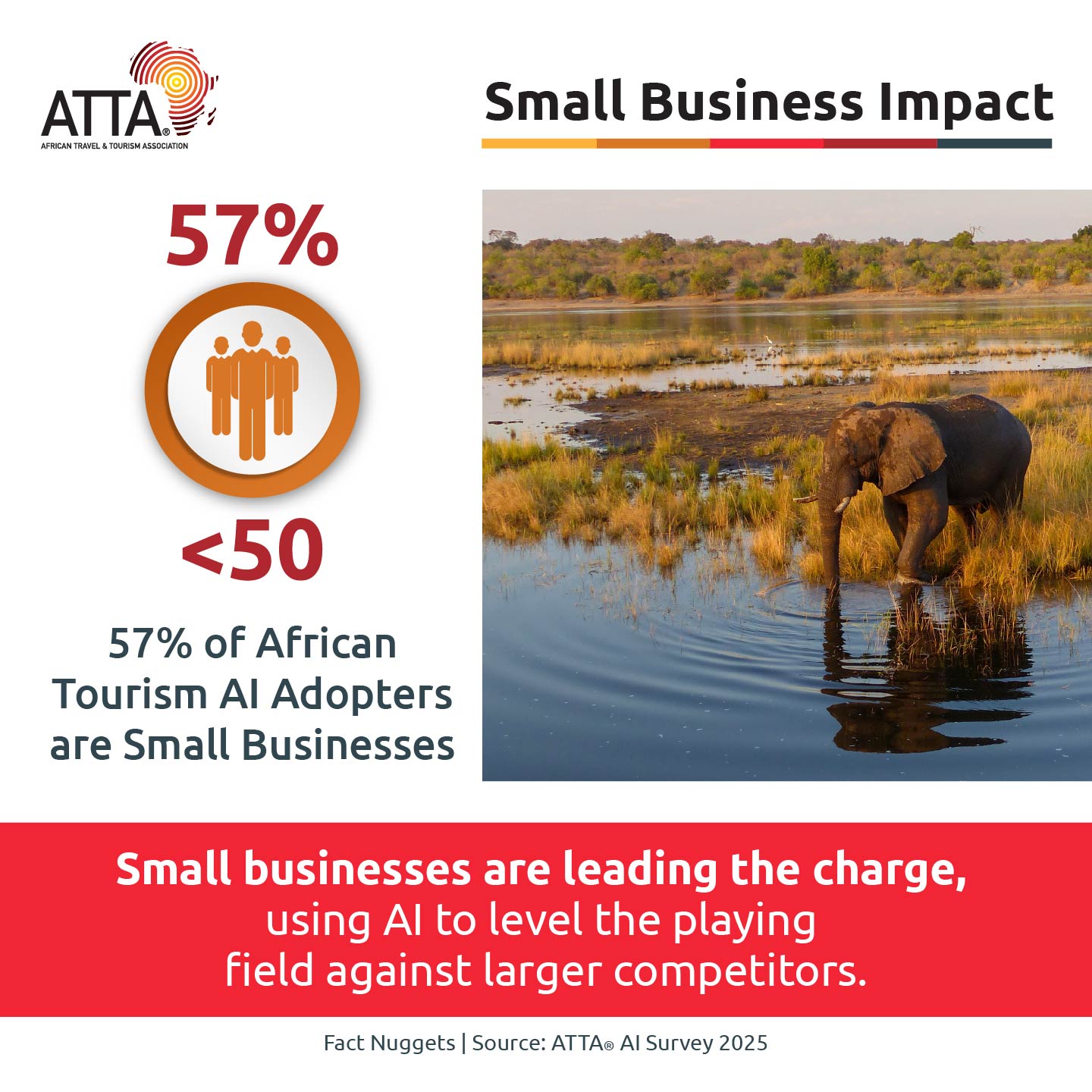AI as the Great Equaliser: How Small African Tourism Businesses are Competing Globally

A small safari lodge in the Serengeti with just 15 employees can now serve guests from six continents, providing 24/7 multilingual support and personalised itineraries that rival international luxury chains. A tour operator in Cape Town with a team of five can create professional marketing content in multiple languages, reaching global audiences that were previously inaccessible.
What's behind these transformations? Artificial intelligence—the great equaliser in African tourism.
ATTA®'s recent survey has revealed a remarkable trend: small tourism businesses across Africa are using AI tools to overcome traditional limitations of size and resources, putting them on a more level playing field with global competitors.
The ‘Small Business’ advantage
Small businesses dominate African tourism. Our survey showed that 57% of respondents operate with fewer than 50 employees. Traditionally, this limited scale has presented challenges in global competitiveness—but AI is changing the equation.
The survey data backs this up: among businesses with fewer than 50 employees, 58% are already using AI tools, with marketing applications leading the way (86.7%).
Much like Africa leapfrogged landline infrastructure straight to mobile technology, we're now seeing a similar phenomenon with AI. Small operators are bypassing legacy systems and adopting state-of-the-art AI tools directly.
This technological leapfrogging is particularly powerful in key areas:
- 24/7 global customer service
Perhaps the most dramatic equaliser is in customer engagement. AI-powered chatbots enable even the smallest businesses to provide round-the-clock support in multiple languages.
A small tour operator can now engage visitors from any time zone, answering queries about itineraries or local attractions instantly. Survey respondents highlighted customer experience (42.7%) as one of their top AI application areas, with the technology enabling:
- Instant responses to booking inquiries from international travellers
- Multilingual support without hiring language specialists
- Consistent information across all customer touchpoints
- After-hours engagement when human staff are unavailable
- Content creation and marketing reach
Marketing emerged as the dominant AI application (86.7%), with small businesses leveraging generative AI to produce high-quality content that previously required expensive agencies or specialised staff.
The marketing advantage is particularly striking in:
- Content creation in your brand tone of voice
- Multilingual marketing materials opening international markets
- Automated social media campaigns that maintain consistent engagement
- Data-driven marketing decisions previously only available to larger operators
- Operational efficiency with limited staff
Operations and administration ranked high (46.7%) among AI applications, with small businesses using AI to streamline workflows and reduce manual tasks. This operational boost is particularly valuable for businesses with limited human resources, allowing them to reallocate time to activities that enhance guest experiences.
AI is helping by:
- Automating repetitive administrative tasks
- Generating standard operating procedures
- Assisting with inventory and resource management
- Providing data analysis for strategic decision-making
Navigating the "Triple Threat"
Despite the enthusiasm, small African tourism businesses face what our survey identified as the "Triple Threat" to AI adoption:
- Talent: 81.2% cite lack of technical expertise as their primary challenge
- Time: 44.7% point to lack of time or resources to learn new tools
- Treasury: While only 27.1% cite cost as a barrier, budget considerations remain important
Perhaps the most compelling aspect of AI adoption in African tourism is how it enables small businesses to maintain their unique local character while achieving global competitiveness.
The path ahead
Looking ahead, the outlook for AI-powered small businesses in African tourism is promising. Our survey found that 71.8% are likely to invest in AI tools or training within the next 12 months, with many focusing on practical applications specific to tourism.
For small businesses considering their AI journey, our research suggests several key strategies:
- Prioritise high-impact areas first: Start with customer-facing applications that directly generate revenue
- Invest in practical training: Focus on tourism-specific AI applications rather than theoretical concepts
- Embrace the "digital equaliser" mindset: Recognise that AI can help overcome traditional disadvantages of scale
- Build AI literacy across the organisation: Ensure all team members understand the potential and limitations
- Share success stories within the community: Learn from peers who have successfully implemented AI solutions
As AI democratises capabilities once reserved for industry giants, we're witnessing the emergence of a more inclusive, diverse tourism landscape in Africa. Small, locally-owned businesses are finding their competitive edge.
In some ways, being small makes us more adaptable with these new tools. Small businesses can move faster and be more personal, while using AI to handle the heavy lifting that used to hold them back.
The great equaliser indeed.
If you found this interesting, click here for more ATTA® resources on Generative AI in Travel. Note this if for members only
